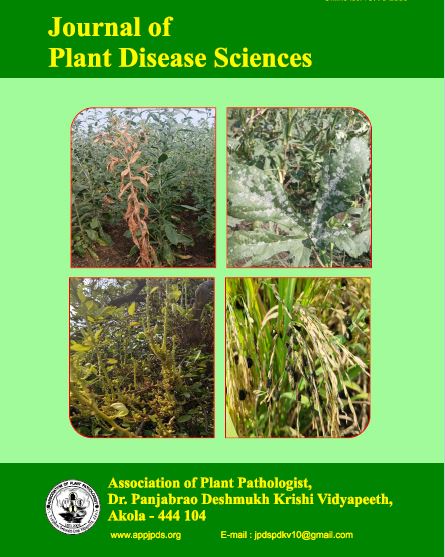Screening Of Gladiolus Varieties And Hybrid Lines Against Fusarium Wilt
DOI:
https://doi.org/10.48165/Keywords:
Gladiolus, Fusarium wilt, screening and varietiesAbstract
Fusarium solani reduces the quality, yield and market value of gladiolus. The pathogen is soil borne in nature, hence difficult to control. Cultivation of resistant varieties is the effective and cheaper method to combat as compared to chemical control. Hence twenty five varieties and thirty five hybrid lines were screened in artificial sick soil under natural field condition against wilt disease. Out of twenty five gladiolus varieties only one variety IIHR-77-59-32 was free from wilt disease while 22 varieties showed moderately resistant reaction along with two (Psitacinus hybrid and Sancerre) exhibit susceptible reaction to Fusarium wilt. Among the thirty five gladiolus hybrids, two hybrids viz. 07-7 and 07-23 were free from wilt disease and remaining hybrid showed moderately resistant reaction.
References
Bajaj K.L., Arora J.S., Kaur P.P. 1989: Biochemical differences in tolerant and susceptible varieties of gladiolus to Fusarium wilt. J. Res. Punjab Agric.Univ. 26: 585-587.
Booth C., 1971: The Genus Fusarium. Common Wealth Mycological Institute, Kew surevey, England: 137. Chen L.Z., X.B.Gan, J. Y.Song, W.Gu,1994: A study on gladiolus root rot. J. Shanghai Agric. College 12: 240-246.
Chandra, K.J. S. S. Negi, S. P. S. Raghara and T.V.R.S. Sharma, 1985: Evaluation of gladiolus cultivars and hybrids for resistance to Fusarium oxysporum f. spp. gladioli. Indian Journal of Horticulture, 42 (3/4): 304 -305.
Dohroo, P. and S.K. Sharma, 1992: Variability in Fusarium oxysporumf.sp.zingiberi, the incitant of yellows. Indian Phytopath., .45: 247-248.
Kaikal, V.S. and J. R. Nauriyal, 1964: It’s easy to grow gladioli. IndianHorticulture, 8(3): 11- 14.
Mayee C. D. and V. V Datar, 1986: Phytopathometry. Technical Bull-I, MAU, Parbhani : 88-89.
McCulloch, L., 1944: Fusarium yellows of gladiolus. Phytopathology, 34:263-287.
Nazir, I. A. and S. Riazuddin, 2008: New approaches to generate disease-resistant gladiolus. World Journal of Microbiol. Biotechnol., 24: 367-378.
Palmer, J. G. and R. L. Pryal, 1958: Evaluation of 160 varieties of gladiolus for resistance to Fusarium yellows. Plant Disease Reporter, 42: 1405-1407.
Pathania, N.S. and R. L. Misra, 2000: In vitro mutagenesis studies in gladiolus for induction of resistance to Fusarium oxysporum f. sp. gladioli. International Horticultural Congress: Elegant Science in Floriculture. Acta Horticulturae. 624: 26.
Tarabeih A.M., S.H. Michail, A. J. Al-Zarari., S.Sultan, 1981: Fusarium wilt of gladiolus with reference to varietal response and chemical control in Iraq. Acta Phytopath.,16: 293-297.
Tomar, M., 1997: Studies on the management of gladiolus yellows caused by Fusarium species. M.Sc. Thesis, Dr Y. S. Parmar University of Horticulture and Forestry, India.

